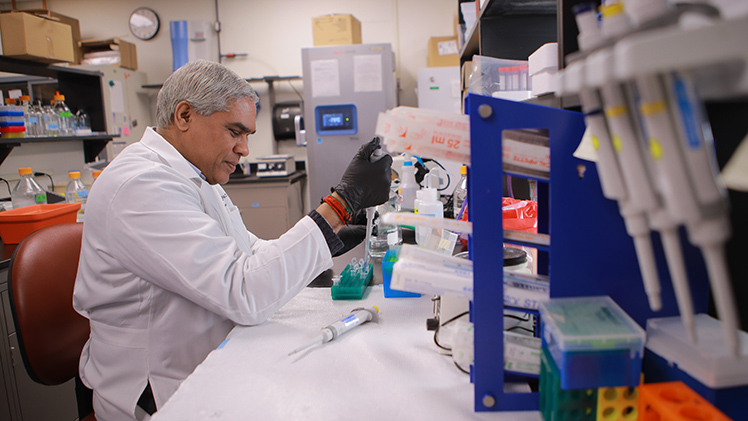Breast cancer is not one singular disease but rather a collection of conditions that each have their own unique properties and pathology.
One of the most lethal forms is triple-negative breast cancer, which is more aggressive, often more difficult to treat and more likely to return after treatment than other types of breast cancer.

With a five-year, $2 million grant from the National Cancer Institute, Dr. Dayanidhi Raman, an assistant professor of cell and cancer biology at UToledo, and a team of researchers are looking to advance a discovery to more effectively treat an aggressive form of breast cancer.
“The incidence of triple-negative breast cancer is only 15% among all breast cancer patients, but among that group, 90% will die of the disease,” said Dr. Dayanidhi Raman, an assistant professor of cell and cancer biology at The University of Toledo College of Medicine and Life Sciences. “That is the seriousness of the issue we’re facing.”
A potential new actionable molecular target called eIF4A1 could possibly be the key to stopping both the drug resistance and aggressive metastases that characterize triple-negative breast cancer.
With a five-year, $2 million grant from the National Cancer Institute, Raman and a team of researchers from the UToledo College of Medicine and Life Sciences and College of Pharmacy and Pharmaceutical Sciences are looking to advance that discovery and potentially enable clinicians to one day more effectively treat the aggressive disease.
Early on, triple-negative breast cancer is generally receptive to conventional chemotherapy. The problem is that those anti-cancer drugs often stop working, allowing the cancer to return and spread.
The reason for that, Raman said, is that chemotherapy can’t get to the small subset of cancer stem-like cells deep in the tumor. Those cells, which have survived and grown immune to existing treatment, allow the cancer to reemerge and progress unchecked.
“Getting to these cancer stem-like cells is the lynchpin to contain drug resistance. They are causing the relapse, causing the resistance and making the cancer grow more aggressive,” Raman said. “Patients are in desperate need for something to contain their cancer growth and prevent metastases, particularly to the lung.”
Prior research has found up to 40% of triple-negative breast cancer first metastasizes in the lung, making it both the most common site of metastasis and a far more common location of spread than seen in other breast cancers.
Raman believes that by targeting the protein eIF4A1, and possibly other related signaling pathways that are dependent on eIF4A1 activity, clinicians might be able to limit the spread of cancer or contain drug resistance.
For cancer stem-like cells to cause the tumor to return, they depend on the action of eIF4A1 to unwind the convoluted oncogenic, or tumor-inducing, messenger RNA that is responsible for creating proteins that produce, sustain and spread cancer cells to all other organs.
Raman’s NIH-funded research goals are centered on understanding the mechanisms of how inhibiting eIF4A1 not only freezes the cancer’s growth and metastasis, but also stops cancer cells’ ability to export out drugs that once would have killed them.
“Breast cancer patients die because of metastasis. When the cancer goes to the lung, brain or bone, they have a very poor prognosis,” Raman said. “That is why we’re targeting metastasis, and why we’re so excited for this project. We’ve seen significant promise in targeting eIF4A1, but we need more mechanistic information to truly move this forward toward a potential treatment.”